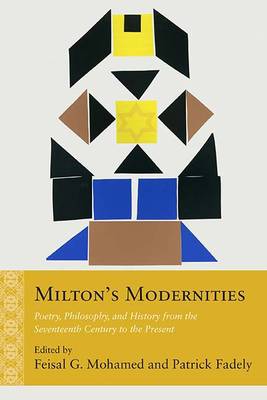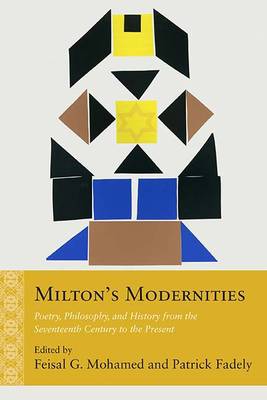
- Afhalen na 1 uur in een winkel met voorraad
- Gratis thuislevering in België vanaf € 30
- Ruim aanbod met 7 miljoen producten
- Afhalen na 1 uur in een winkel met voorraad
- Gratis thuislevering in België vanaf € 30
- Ruim aanbod met 7 miljoen producten
Zoeken
Milton's Modernities
Poetry, Philosophy, and History from the Seventeenth Century to the Present
Feisal G. Mohamed, Patrick Fadely
€ 127,45
+ 254 punten
Omschrijving
The phrase "early modern" challenges readers and scholars to explore ways in which that period expands and refines contemporary views of the modern. The original essays in Milton's Modernities undertake such exploration in the context of the work of John Milton, a poet whose prodigious energies simultaneously point to the past and future. Bristling with insights on Milton's major works, Milton's Modernities offers fresh perspectives on the thinkers central to our theorizations of modernity: from Lucretius and Spinoza, Hegel and Kant, to Benjamin and Deleuze. At the volume's core is an embrace of the possibilities unleashed by current trends in philosophy, variously styled as the return to ethics, or metaphysics, or religion. These make all the more visible Milton's dialogues with later modernity, dialogues that promise to generate much critical discussion in early modern studies and beyond. Such approaches necessarily challenge many prevailing assumptions that have guided recent Milton criticism--assumptions about context and periodization, for instance. In this way, Milton's Modernities powerfully broadens the historical archive beyond the materiality of events and things, incorporating as well intellectual currents, hybrids, and insights.
Specificaties
Betrokkenen
- Auteur(s):
- Uitgeverij:
Inhoud
- Aantal bladzijden:
- 376
- Taal:
- Engels
- Reeks:
Eigenschappen
- Productcode (EAN):
- 9780810135345
- Verschijningsdatum:
- 15/08/2017
- Uitvoering:
- Hardcover
- Formaat:
- Genaaid
- Afmetingen:
- 152 mm x 231 mm
- Gewicht:
- 657 g

Alleen bij Standaard Boekhandel
+ 254 punten op je klantenkaart van Standaard Boekhandel
Beoordelingen
We publiceren alleen reviews die voldoen aan de voorwaarden voor reviews. Bekijk onze voorwaarden voor reviews.











